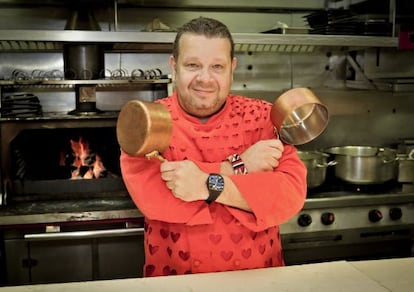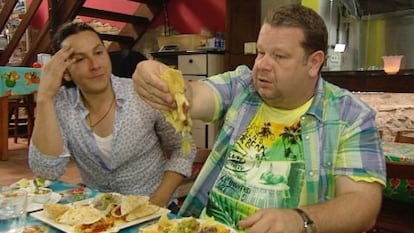A real nightmare... or an invention?
The reality TV show hosted by chef Alberto Chicote is laSexta's big hit of the season But controversy is being stirred up by disgruntled restaurateurs who have participated

LaSexta has found the perfect program for its evening schedule. Every Thursday since it first aired in late October, it has drawn over 2.5 million viewers, representing an audience share of 12.6 percent. Pesadilla en la cocina is a reality show modeled after the US program Kitchen Nightmares, in which the outspoken chef Gordon Ramsay has been replaced with his Spanish counterpart, the equally blunt Alberto Chicote.
Working as an expert adviser, every week the host visits a new restaurant that is on the brink of shutting down, and sets forth a strict regimen of improved menus, better work relations, a revamped look and realistic growth plans, all with a view to refloat the struggling business.
So is there a dark side to the big television success of the season? While some restaurant owners praise the expertise and results obtained by Chicote, others call the whole thing "a swindle."
"It's about sharing our experience and knowledge with people who lack them, otherwise things would not be going as badly for them as they are," says the host of the program. "Every time we complete a show, the team and I are convinced that those businesses now have a new chance that they never would have had without us. But from that point on it is up to them to change things around," adds Chicote, who worked at trendy Madrid restaurants in the 1990s but is primarily known for his appearances at food summits, his cooking lessons and his media contributions (he used to be a columnist for EL PAÍS).
Some praise the results while others say the whole thing is "a swindle"
To get the businesses up and running again, the chef and the team of professionals who work with him prepare an "action plan" that takes in all aspects of each business, from the number of diners to the location or the technical possibilities of the premises. The chef also has to deal with outspoken cooks, obstinate owners and unmotivated personnel. But the seven episodes that have been aired so far out of the 10 that make up the season (all of which were recorded months ago) have left some recipients with a bitter taste.
The thing is, not everyone falls back on their feet after Hurricane Chicote has come and gone. Madrid's restaurant El Castro de Lugo shut down before the episode was aired. Dómine Cabra, also in the capital, is under new management and the owners say they have "no connection" with the show. And Nuevo Da Vinci, in Moraira (on the coast of Alicante province), is now closed "indefinitely."
"My experience has been one of complete failure; I feel used," says Rafa Soler, the owner of the latter business. Soler, who is considering suing the show, complains about all the bad advice he got, from the poor quality of the new decoration ("shoddy") to a minimalist menu ("five rice dishes and two desserts, no meat or fish anywhere") and a focus on sensationalism ("the program has no business delving into people's private lives").
After Nuevo Da Vinci reopened, a storm destroyed several mosquito screens that had been put up to create an outdoor dining area, since the rice dishes were all meant to be prepared outdoors, too. "It's insane not to take into account that it can actually rain," notes Soler. But his son, who is also in the restaurant business and who pressed his father to participate in the program, disagrees with him. "The program did everything in its power to leave a perfect restaurant behind. The menu, which I think is very good, uses a lot of fresh produce, and if the weather is bad, you can prepare the meals indoors, and if there is a storm it's normal to sustain some damage," he says. "But my father did not feel like working hard and carrying this through because he did not wish to change his old habits."

Chef Chicote admits that the show, which does not follow a script, does get personal. In the case of Dómine Cabra, the owner revealed on the show that he was suffering from cancer, and in fact he passed away shortly after the episode was recorded.
"This is more than just a trade, it's a way of life, and sometimes personal problems get in the way of good restaurant management," says the host.
But some owners go further in their recrimination. The managers of Opila and La reina del arenal, in Bilbao, called Chicote a homophobe, although they refused to speak with this newspaper. The chef had this to say: "From what I've heard those establishments are doing very well, and I am very happy for them, since that is what we went there for."
The free publicity for the restaurants is one of the more positive aspects of the show, says Alfredo, manager of a bar called La Tana, in the Madrid suburb of Pinto. He declared himself satisfied with the suggestions made by the TV chef. "People drop by to see the establishment and the menu created by Chicote, and the star dish is the hamburger because he said it is the best one in all of Madrid."
What you see is what you get: we don't set anything up," says the chef
Other owners have complained that Pesadilla en la cocina exaggerates things like how dirty the kitchens really are, but Alfredo said he understands that the program is meant to be entertainment, and such is the nature of television. "I went in knowing full well what it would be like, and that it's easy to exaggerate, but I took the risk."
Compressing a week's worth of work into a 50-minute show means many things have to be left out anyway. Editing also plays a role in the end result. "What you see is what you get: we don't set anything up, we don't place items anywhere, but we do make editing cuts," says Chicote, who is very happy about a project that not only ensures him a new season next year, but has also earned him an invitation to host the New Year's Eve program at Puerta del Sol on December 31.
"For now the job seems fantastic, and I don't think I'm going to get tired of it because it is very gratifying," he says, adding that he plans to open his own restaurant in the future. Will he follow his own advice? Will it work?
"There is no magic formula," he explains. "But if you put effort and passion into it, people will notice that."
Tu suscripción se está usando en otro dispositivo
¿Quieres añadir otro usuario a tu suscripción?
Si continúas leyendo en este dispositivo, no se podrá leer en el otro.
FlechaTu suscripción se está usando en otro dispositivo y solo puedes acceder a EL PAÍS desde un dispositivo a la vez.
Si quieres compartir tu cuenta, cambia tu suscripción a la modalidad Premium, así podrás añadir otro usuario. Cada uno accederá con su propia cuenta de email, lo que os permitirá personalizar vuestra experiencia en EL PAÍS.
¿Tienes una suscripción de empresa? Accede aquí para contratar más cuentas.
En el caso de no saber quién está usando tu cuenta, te recomendamos cambiar tu contraseña aquí.
Si decides continuar compartiendo tu cuenta, este mensaje se mostrará en tu dispositivo y en el de la otra persona que está usando tu cuenta de forma indefinida, afectando a tu experiencia de lectura. Puedes consultar aquí los términos y condiciones de la suscripción digital.









































